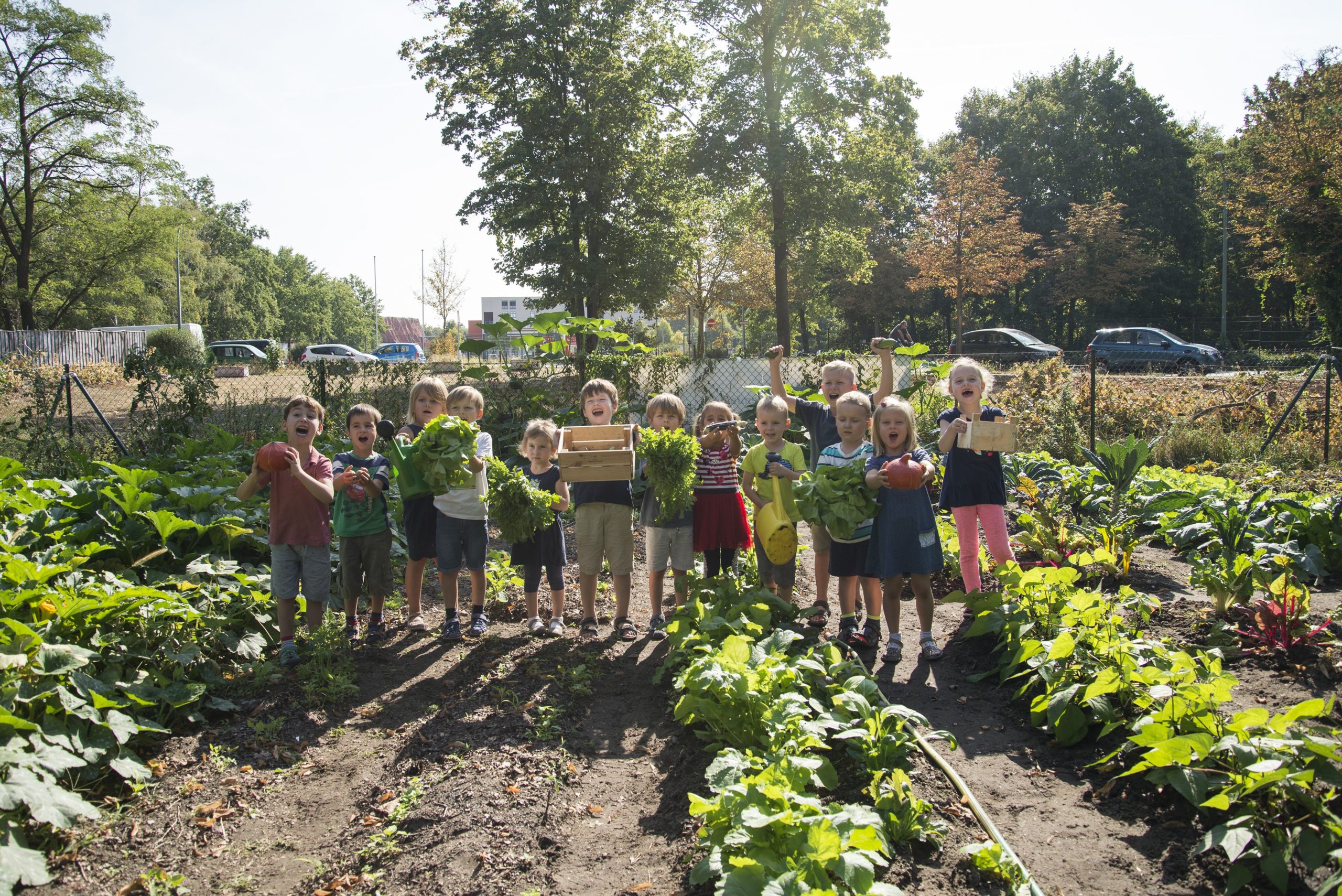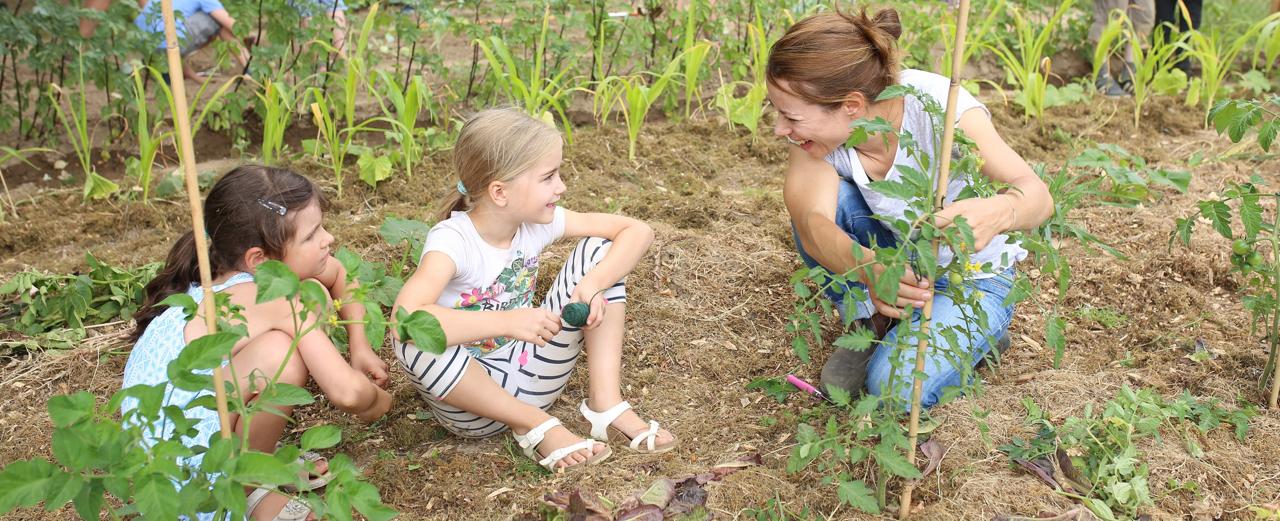 Learning by tilling!
Learning by tilling!
Food education for schools and day-care centres in Germany
"I thought we were planting vegetables today. Where are they?" asks eight-year-old Timo as he enters the school vegetable patch. The gardening teacher points to the seeds and explains to him that carrots, cucumbers, and radishes will one day grow from these tiny grains. Timo is taken aback and can hardly believe it. Scenes like these take place every day in many kindergarten and school gardens, where the GemüseAckerdemie stops by. Some children are apprehensive at first and do not want to touch the "dirty" soil. Spending time in nature is uncommon for many. But curiosity grows with every lesson in the field. The children enjoy moving around and tending the vegetables together. In their own patch of land, the children discover how colourful chard is, smell the scent of ripe tomatoes and wonder when a snail ate all the cabbage. The children's appreciation for food grows along with the vegetables.
Necessity
Creating spaces for experiencing nature and promoting knowledge and skills on the topics of nutrition, food and consumption for children in Germany.
Activity
With the GemüseAckerdemie, children grow their own vegetables on the vegetable patch in the day-care or school field and learn about the ecological interconnectedness of food production.
Countable effort
Number of hours spent in the vegetable patch and number of children benefiting from the GemüseAckerdemie programme.
Result
The children gain important insights into the cultivation and preparation of food. Their appreciation of food grows.
Systemic effect
The children contribute to a society that consumes and produces in a sustainable way and they eat more wholesome food.
Background
Due to the fast pace of our society, excessive consumption and urbanisation, many children and young people lose access to and connection with nature. There is a lack of opportunity to discover nature and experience first-hand how food is produced naturally. Fewer and fewer children know where food comes from and how it is grown (Brämer, 2016). Since a large proportion of food is industrially processed, it is difficult to make the connection (Waskow, 2016). This manifests itself in a lack of appreciation for the food and high levels of waste. This alienation also has a negative impact on eating culture and health (Eberle, 2007): Over 15 per cent of 3- to 17-year-olds in Germany are overweight, almost 6 per cent are obese (RKI, 2018). The main cause is a combination of bad nutrition and lack of exercise.
In Germany, around 12 million tonnes of food are thrown away every year (Thünen Institute, 2019). However, waste and overproduction have a considerable impact on global climate change (Hic, 2016). Due to a lack of sustainability in the use of resources, the loss of habitats and biological diversity continues to advance. This endangers the livelihoods of all people, animals and plants.
The good deed
Your good deed today gives a child a lesson in a vegetable garden. The GemüseAckerdemie is a year-round, theory and practice-based educational programme with the aim of promoting the appreciation of food and an understanding of agriculture among children and young people. Across Germany, participating schools and day-care centres set up vegetable plots on which the children grow around 30 different types of vegetables. From planting to harvesting and processing, they experience the entire process of value creation with regard to their vegetables. Using further educational materials, the children acquire knowledge and skills on the subject of vegetable cultivation and on the global interconnectedness of food production and the effects of their own consumption. Gardening together bears fruit and promotes the appreciation of wholesome food.

AboutGermany
Berlin
Capital
83.132.800
Number of inhabitants
46.946 $
Gross domestic product per capita per year
Placed 4th out of 189
Human Development Index
In Germany, over 12 million tonnes of food end up in the trash every year - 75 kg per person is wasted in private households (Thünen Institute, 2019).
About the organization and further information
Association
Ackerdemia e.V.


Further information and source
- Ackerdemia e.V., 2020. Ackern schafft Wirkung – Wirkungsbericht 2019, Potsdam.
- Brämer, R. et al., 2016. 7. Jugendreport Natur 2016 – Natur Nebensache?, Universität Köln.
- Bundesministerium für Ernährung und Landwirtschaft (BMEL), 2019. Deutschland, wie es isst – Der BMEL-Ernährungsreport 2019, Bonn.
- Eberle, U., 2007. Ernährungswende – Eine Herausforderung für Politik, Unternehmen und Gesellschaft, Öko-Institut, Freiburg/Darmstadt.
- Gesundheitsberichterstattung des Bundes, Robert Koch-Institut und Destatis, 2018. KiGGS Welle 2 – Gesundheitsverhalten von Kindern und Jugendlichen. Journal of Health Monitoring 3 (2), Berlin.
- Hic, C. et al., 2016. Food Surplus and Its Climate Burdens, Environ. Sci.Technol, Washington, D.C.
- Robert Koch-Institut (RKI), 2018. KiGGS Welle 2 – Übergewicht und Adipositas im Kindes- und Jugendalter in Deutschland, Journal of Health Monitoring 3 (1), Berlin.
- Thünen-Institut, 2019. Lebensmittelabfälle in Deutschland – Baseline 2015, Braunschweig.
- Waskow, F. et al., 2016. Situationsanalyse zu Lebensmittelverlusten im Einzelhandel, der Außer-Haus-Verpflegung sowie in privaten Haushalten und zum Verbraucherverhalten (SAVE), Deutsche Bundesstiftung Umwelt Studie, Osnabrück.




